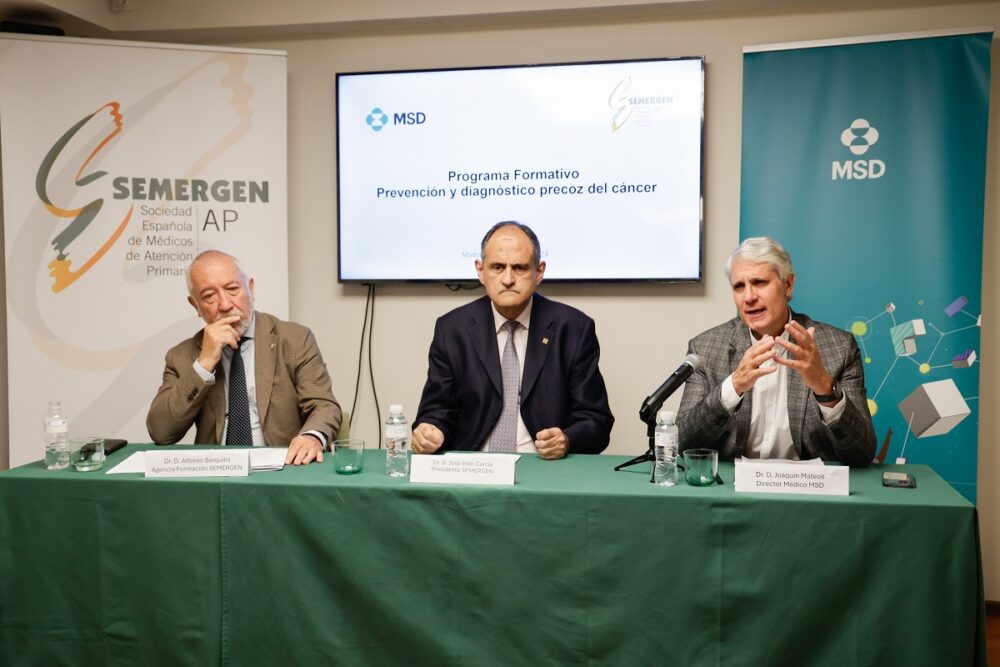MSD and Semergen provide training on cancer prevention and detection for PC specialists

Prevention and early diagnosis of cancer are important, and primary care providers (PCs), as the patient’s first point of contact with the health care system, must be trained and have updated knowledge about the signs and symptoms prevalent in cancer. In this sense, the Spanish Society of Primary Care Physicians (Semergen) and MSD have presented an online training program on cancer prevention and detection from AP: “Prevention and Early Diagnosis of Cancer”.
Jose Polo, President of Semergen, emphasized that society strives for quality education and that, in addition, “in the society in which we live, early diagnosis of cancer is important, and if done early, many of these patients can become chronic.” In this line Alfonso Barquilla, course coordinator and member of Semergennoted that the AP Society also seeks to promote “orphan” activities such as palliative care or genetics education.
“Cancer is so common that we have 300,000 cases a year in Spain and, in addition to deaths, it leads to a decrease in quality of life, productivity, etc. All this requires health professionals to have the knowledge that allows them to diagnose the disease as soon as possible ” Barquilla said. “The course has been around for a while and every year we update it with new modules, videos, documents and other materials, keeping it very comprehensive and constantly updated,” added the course coordinator. Currently, there are tumors with a high percentage of patients diagnosed at late stages. Therefore, bet on continued training in primary care Preventative measures and early signs and symptoms can reduce the incidence of cancer and improve the prognosis of detected cases.
“Cancer is a complex, changing pathology that requires updating, so medical training is necessary. PA plays an important role in the early detection of cancer and is the first line to which patients turn. The sooner the diagnosis is made, the sooner treatment can begin and the better the prognosis of the disease,” he noted. Joaquin Mateos, MSD Medical Director. “We believe it is very important to identify common symptoms or signs that will allow the PC physician to detect them and make diagnosis easier. At MSD, we have a strong commitment to innovation, and today we conduct more than 1,600 clinical trials in the field of cancer. “We are getting good results in prognosis and treatment, but we believe that the earlier the disease is detected, the more patients we can treat,” Mateos said.
Interdisciplinary collaboration
The training program consists of two editions with four modules every. The first episode of the program covers chest tumors, melanoma, breast cancer and nephro-urological tumors. The second edition is devoted to tumors of the head and neck (oral cavity, salivary glands, pharynx and larynx), digestive organs (esophagus, stomach, rectum) and gynecological (cervix, endometrium and ovaries).
interdisciplinary collaboration Prevention and early diagnosis of cancer, as well as the subsequent approach to it, are important among specialists. “Primary care plays a key role in detecting cancer at an early stage, and this factor will facilitate rapid referral of the patient to cancer services and, in turn, reduce the risk of mortality and morbidity,” Mateos said. “MSD supports this training as a sign of its commitment to cancer prevention and early detection from an interdisciplinary perspective,” he said.
Educate and train
Similarly, during the course presentation it was mentioned screening programs which are currently available in Spain, to which Polo noted that “although more programs need to be implemented, the main thing is coverage. “If it doesn’t reach patients, it’s not working well.” On the other hand, Barquilla wanted to point out that measures taken, such as tobacco restrictions, are also important in the fight against cancer, but “beyond that, we must raise awareness of the importance and impact of food on our lives.” health. “We need to educate the public about health and lifestyle issues.”
On the other hand, Mateos emphasized role vaccine in the fight against cancer. “In Spain the anti-vaccine movement is smaller than in other countries and that says a lot about the country and its awareness. And in many cases, this knowledge and awareness comes from primary care. In this regard, vaccination against human papillomavirus (HPV) stands out, which “represents similar vaccination rates for girls and boys, and vaccination of children with this vaccine has been good. In this sense, the work of the PC doctor and pediatrician is important.
“Everything involves persistence, training and education,” concluded Semergen’s president.
You may also like…
MSD Announces Plans to Conduct Clinical Trials of New Multivalent HPV Vaccine